
Barter and trade is not dead! I’ve long touted this unconventional system as a fabulous way to circumvent paying for services, but I’ve sensed hesitancy to dive in from many of you. And so, today I bring you tales of other people (not just weirdo me!) utilizing the ethos of barter and trade for everything from free dance classes to haircuts to childcare.
I posed the question to our Frugalwoods Facebook group–something I do periodically (last month’s query was on frugal Valentine’s Day celebrations)–and folks responded with innovative stories of frugal barter and trade. I love learning from you all and I’m so grateful to each of you for sharing your wisdom.
The Three Methods of Barter And Trade
Through my own experience, and from hearing your stories, I’ve come to realize there are three modes of barter and trade: formal, informal, and skill-based. Allow me to elaborate.
1) Formal
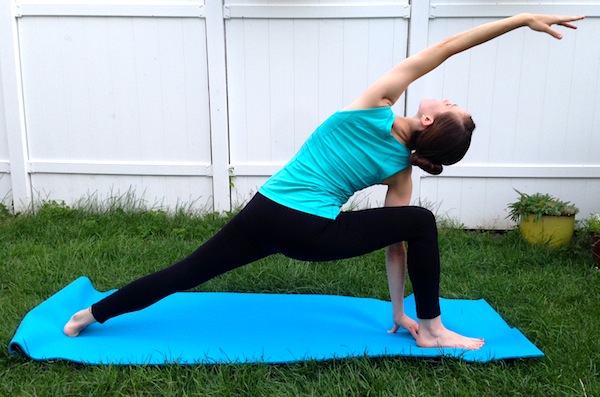
When we lived in Cambridge, I had a formal arrangement with my yoga studio whereby I worked at the front desk in exchange for free classes. I checked people in for class, processed their payments, then mopped the studio floor and took out the trash after class. This was a system the studio offered to anyone who was interested. There was a brief orientation/training program and then an even exchange of one free class for each desk-staffing stint.
Conveniently I could attend the classes I worked at the desk for. I was responsible for informing the manager in advance if I needed to miss one of my shifts. I took a brief maternity leave when Babywoods was born and then went back to my shift a month or so after her birth. This was very much like working an hourly job where I was expected to show up at a certain time and I received a specified exchange rate for my services. I absolutely loved it since yoga classes at the studio were $18 each!
2) Informal

The second type of barter and trade is a more informal system, often between friends or neighbors that lacks the precision of my yoga trade. I currently have this style of trade with one of my very generous neighbors.
My neighbor, who is in her 60s, along with another neighbor who is 9 years old, come over together once a week for an hour or two to watch Babywoods. The three of them go on hikes, read books, and play. It’s the most amazing gift two work-at-home parents with no formal childcare could ever hope for. And just last night, our neighbor came over after Babywoods went to bed so that Mr. FW and I could go out on a date!!! I’m filled with gratitude every time they come over and in fact, they’re watching Babywoods as I write this!
My neighbors don’t charge me for this service, rather, we’ve agreed on an informal, loose barter and trade system whereby Mr. Frugalwoods and I will help them out when they need it. We’re currently helping our neighbor select and set-up a new computer and phone, which is a small way we can start to repay the favor. There’s no formal agreement or contract and we don’t keep track of hours. I’ve found this type of barter to be quite common up here in our small Vermont town, where neighbors often lend a hand to one another.

However, rural Vermont isn’t the only place for such arrangements. Back in our city days, we had a network of friends we swapped dog sitting with. This wasn’t a formalized process–we’d watch one another’s dogs whenever we were able to and if one person couldn’t take a dog, they’d refer them to another family. It was a perfect way to ensure none of us had to pay to board our dogs. And the dogs had a much nicer time hanging out at a friend’s home as opposed to in a kennel.
Another excellent example of informal bartering is the Buy Nothing Project, an international organization with hyper-local branches–facilitated through Facebook–where neighbors give unneeded items away to each other. There’s no tracking system of who gives what or how much or how often. It operates on karma and the system works surprisingly well.
The idea behind Buy Nothing is to decrease spending, consumption, and waste. The premise is simple: I have something I no longer need and you would like to have it! Check to see if there’s a Buy Nothing group in your area, or, consider starting your own. In addition to Buy Nothing, I’m a member of several local email listserves and other swap/garage sale/parent groups through Facebook that are excellent sources for giving and receiving hand-me-downs.
3) Skill-based

We all have a skill to share! Traditional service skill sets–hairdressers, mechanics, photographers–are professions that lend themselves well to bartering for services. But non-traditional skills are also barterable–such as writing, editing, computer help, and more! Quite a few readers cited utilizing their professional aptitude–from social media management to cooking–in exchange for other goods. Get creative and think of what unique skill you can offer.
Do It For Your Kids
One of the biggest challenges I hear from frugal parents is the issue of how to pay for the various lessons their children want to take. Tennis, ballet, swimming–this stuff can add up! However, it seems our frugal braintrust has come up with a solution: barter and trade! As you’ll read in the below list of examples, quite a few clever parents have negotiated a barter/trade system for their child’s lessons. Brilliant! This is definitely something I’ll explore when Babywoods is old enough to express interest in taking a class.
But I Can’t Ask People To Do Things For Me!
I often hear this rebuttal from readers and I completely understand where you’re coming from. It feels awkward because our culture has all but eliminated the barter and trade mentality. We live in a society that expects us to pay for everything–we barely do anything for ourselves anymore, let alone give of our time to our neighbors!
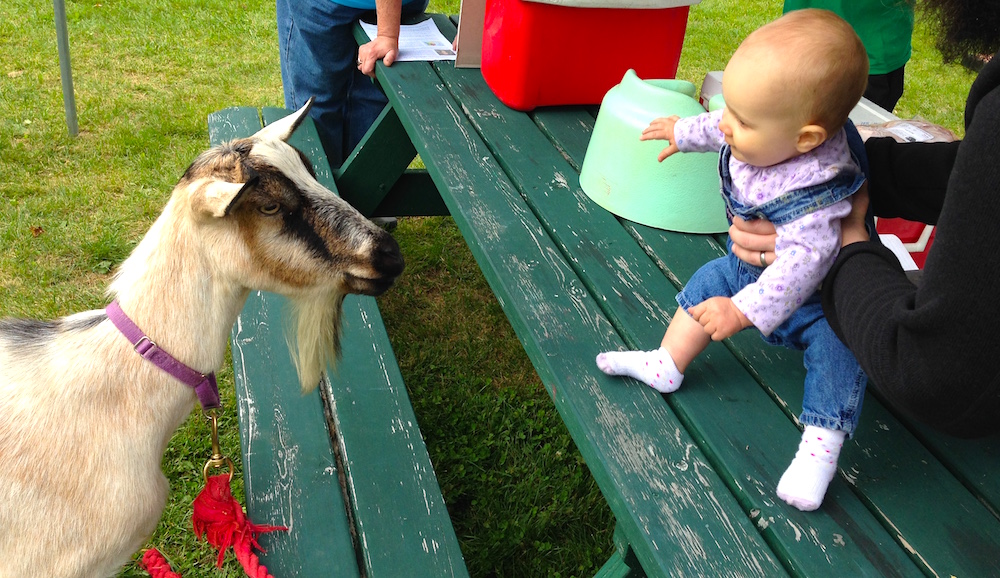
But the frugal philosophy advocates that we buck this mainstream convention and instead seek out ways to circumvent using money to solve our problems and do our chores. In addition to insourcing–aka doing things yourself–bartering with neighbors is a central tenet of effective frugality.
I’m a proponent for building a strong community, whether it’s with your entire town, your cul-de-sac, or your friends–we all need the benefits of community. The intergenerational aspect of community is also profoundly important and largely absent our hectic, siloed modern lives.
What I’ve found is that while we’re often afraid to initiate a barter and trade conversation, it’s highly likely the person on the other side will be overjoyed at the prospect! Yes, it does take some creativity and initiative to establish barter and trade relationships, but I find it’s tremendously worth it. And the worst that anyone can say is ‘no’–although I’ve never had anyone tell me that. There’s a sense of humility in barter and trade–we’re admitting that we need help and that we need the support of our community members. It’s a rewarding, humbling experience. And, regardless of what the IRS might wish, most bartering is small scale and below any reasonable level of tax reporting. Please do note that I’m not an accountant and am not offering tax or legal advice.
Don’t Take My Word For It
You’re probably tired of hearing from me at this point, so let’s turn to the plethora of Frugalwoods readers who weighed in with their own real life examples of barter and trade. Thank you to everyone who shared their story and I’m sorry I couldn’t fit everyone’s suggestions on this list! You can check out the full conversation here.
How Frugalwoods Readers Barter and Trade:
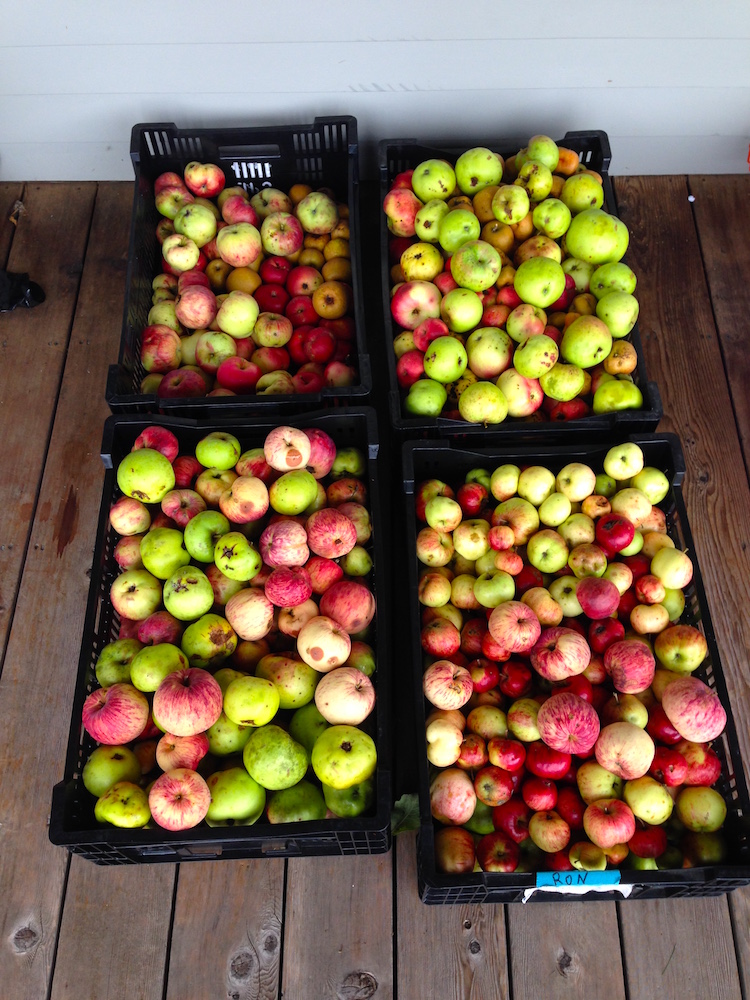
Tara, a photographer, used to trade photography for haircuts and once did a photo shoot in exchange for a custom mantle piece for her fireplace.
Matt, a lawyer, has traded legal services for homegrown produce and eggs.
Michelle snagged discount swim lessons for her kids in exchange for promoting the school to her neighborhood.
Candice barters homemade food–soup, pirogies, cabbage rolls, and more–for everything from haircuts to child care.
Nora’s husband is a mechanic and they’ve bartered car repairs for home repairs, chiropractic services, and more!
Jana manages the social media for her local gym in exchange for free personal training sessions. This is something she arranged individually with her gym, not a formal program like my yoga studio barter. So if your gym/studio doesn’t offer a program, propose one!
Michelle works at an organic farm in exchange for a CSA share of food.
Darcy volunteers for the Charleston, South Carolina County Parks and Recreation Department for 35 hours per year in exchange for free annual passes to local attractions including museums, the aquarium, parks, and more. I’m keeping this one in mind for the future–sounds like a wonderful deal!
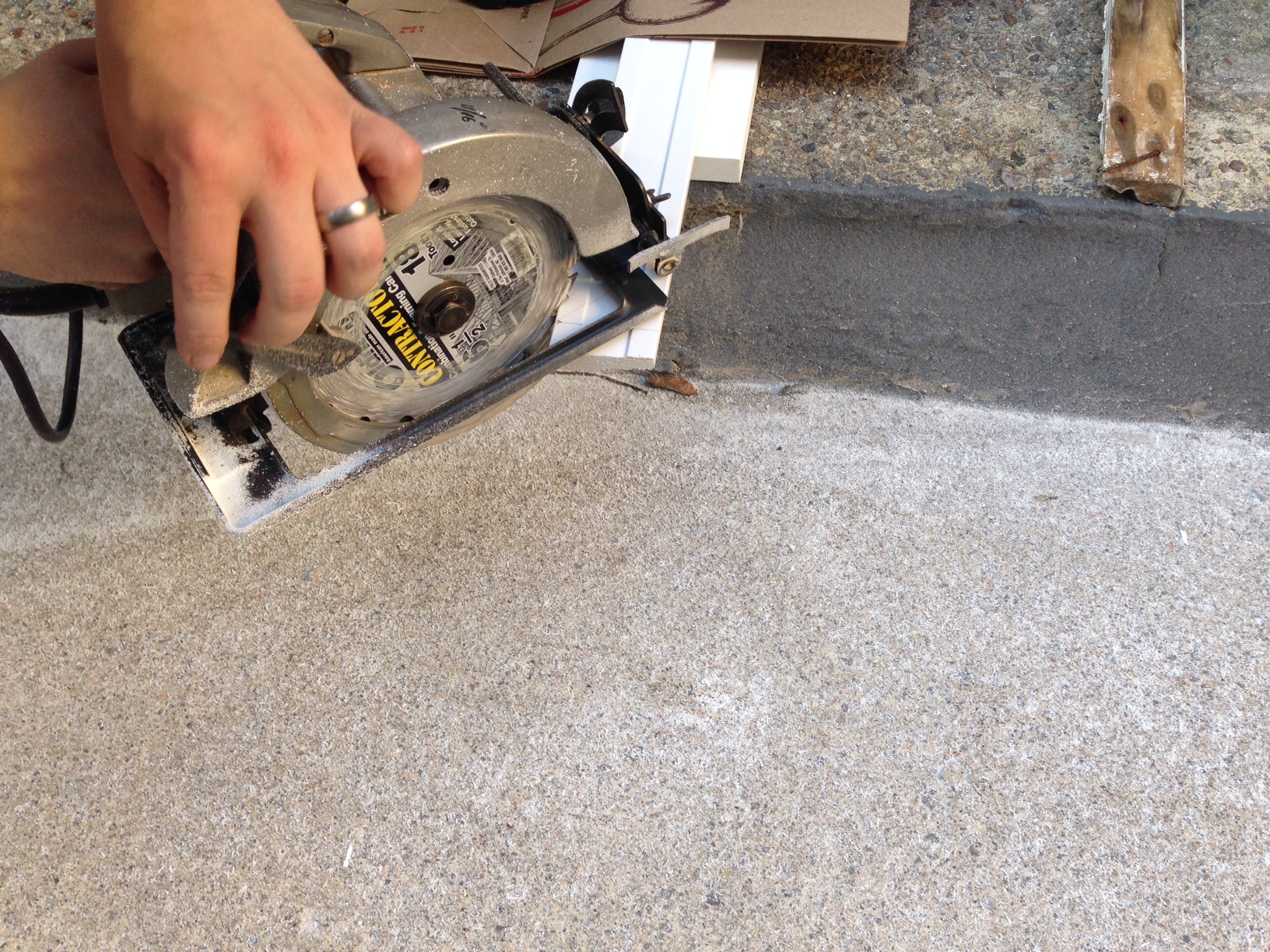
Jill’s friend is a hair stylist and she cleans her house and/or watches her kids in exchange for free haircuts.
Amy swaps her organizing skills for personal training.
Renee trades knitting for home canned salsa and pickles. Yum!
Laura participates in a twice yearly community clothing swap.
Jessica gives flute lessons in exchange for massages.
Stefanie shared that on her recent trip to Colombia, the owner of the hostel where she was staying took her to lunch to ‘pick her brain’ about marketing to millennials in exchange for several free nights at the hostel.
Teresa watches her cousin’s kids every summer in exchange for carpentry work from her cousin, who is a contractor.

Melody built a website for her mechanic in exchange for car repairs and a website for her handyman in exchange for hanging and framing a door in her home. And, she once traded her old car in order to have her basement finished into an office!
Patricia traded house cleaning for child care.
Ashley’s husband did graphic design work for a local drum teacher in exchange for free drum lessons for their son.
Laura offered free room and board to a nursing student in exchange for caregiving assistance for her child with significant disabilities and medical issues. The nursing student lived with Laura’s family for almost three years, was a huge help, and got substantial experience working in a complex pediatric care situation, which she was able to translate into a good nursing job upon graduation. A win win!
Jessica taught toddlers ice skating in exchange for free ice time and group lessons. Sidenote: as the parent of a toddler, it’s highly likely that Jessica is a saint since I imagine it’s sort of like trying to teach feral cats how to ice skate… thank you for doing what you do, Jessica!
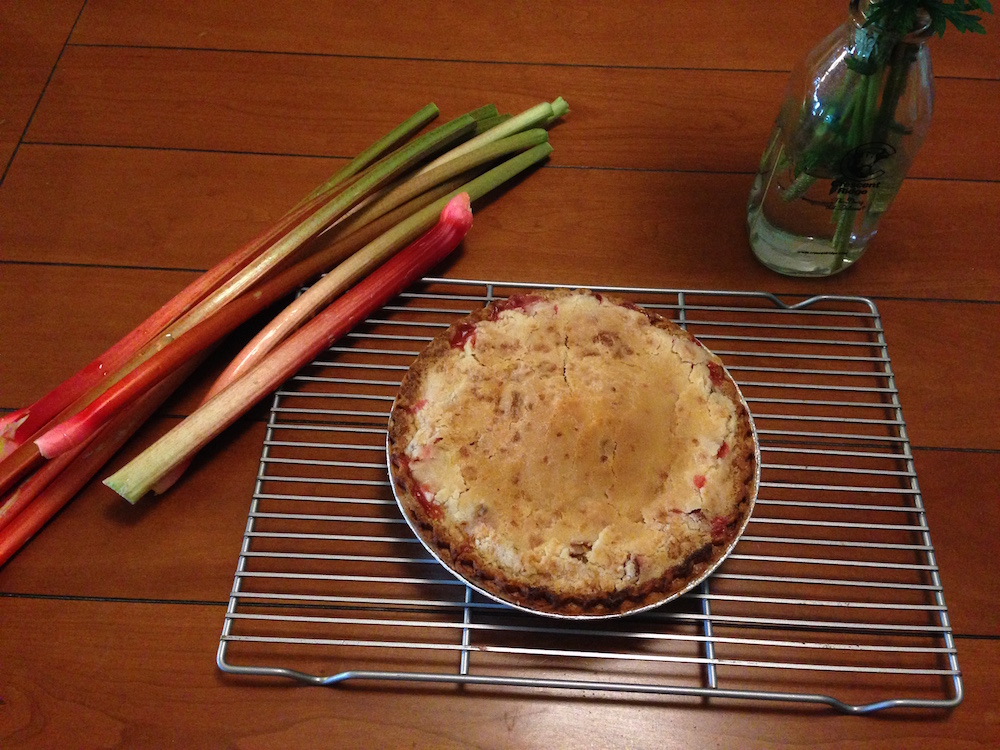
Jeff is a beekeeper, his friend is a hunter, and they exchange honey for meat.
Jannene traded piano lessons for yard work.
Lacey owns a dance studio and has parents that clean the studio, mix recital music, and cut/color her hair in exchange for dance tuition credit.
Tracey-Jayne gets a reduced rate for her daughter’s music lessons in exchange for meals she prepares: eggs from her hens, freshly baked bread or muffins, veggies from the garden, and sometimes lasagna or curry.
Amy works at a local quilt store in exchange for fabric.
Lauren trades babysitting with other parents in her mom’s group.
The Auxiliary Benefits Of A Barter and Trade Lifestyle

I was blown away by the creativity and wide range of things people are bartering and trading for–and this isn’t even the full list! As you can see from the above, it’s entirely possible to barter and trade for just about anything–from legal services to ice skating. But aside from the transactional benefits–namely, that you’re able to employ your time and skills instead of your money–there are other, far more profound benefits to this lifestyle. Chiefly, that you make friends and build community.
Aside from free yoga classes, I loved being part of my yoga studio’s community. I made friends, I created wonderful relationships with my yoga teachers, and I went to yoga on a frequent, regular basis. In my current barter and trade situation, it feels like I now have family members up here in Vermont, where I previously didn’t know a single person.
My community involvement is still nascent since we’ve only lived here for ten months, but I hope to expand and amplify my bartering, trading, and sharing as the years go by. I firmly believe we can combat the mainstream’s clarion call to spend, spend, spend and instead foster meaningful relationships and deep community bonds by, well, helping our neighbors.





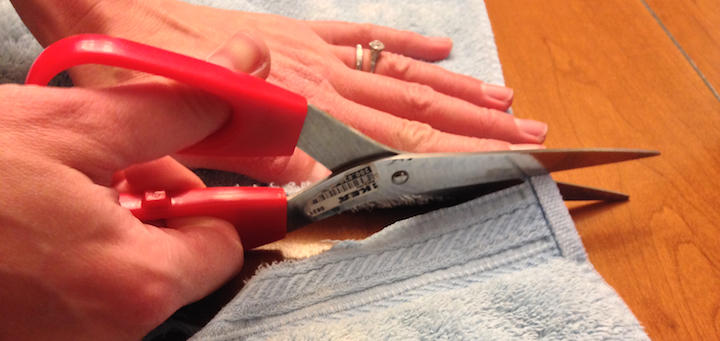

I have JUST entered a very informal barter arrangement with my neighbour. She has started a small business and needs to do a little blog as part of her web presence… and loathes writing. I clean up and make pretty her blog every couple of weeks (it’s literally a couple of paragraphs every 2-3 weeks) and she watches our house when we’re away, which though it happens rarely, is not ”nothing” since it involves feeding two dogs twice a day, various garden watering machinations, bringing in post and generally being the go-to when disaster strikes (only for 1-2 nights at a time for longer we get a house sitter who will walk the dogs and be more present for them).
It’s resolved my ”what about the dogs” headache as and when we’re away for a night or two and she no longer has to pay someone to do what is a 15 minute job.
Sounds like a wonderful system :)!
We actually have a formal barter network where we are here in Texas. There are all kinds of bartering that goes on and its really great to be a part of it. Thanks for reminding us all of the benefits of bartering!
Wes, where in Texas are you? Sounds awesome! I’m in Spring (north Houston) currently, trying to be frugal. Suburbs are cheaper than living in town and my commute was shortened, since I work north of town.
What a great article! Toddlers ice skating is so much fun, btw. We sing songs and play make-believe. I sometimes question what made parents who won’t let their children use forks yet were thinking when they tied knives to their feet, but MOST of the time the kids do great 🙂
“Knives to their feet” hahah! What age do the kids start at? Our pond freezes solid in the wintertime, so I’d like to get Babywoods out there next year.
I was 2 when I started on our pond. It’s doable!
We take them as young as 2, but 3 year olds often have more success with their gross motor skills. Of course, as a parent, you can hold her and glide her along as long as she will hold her feet straight. I don’t hold them up as an instructor.
Even if you eventually want to move to hockey skates, little kids do much better in figure skates because of the tail on the blade- they fall backwards less often. Please use a helmet!
Great advice! Thank you! I’ll now be on the lookout for used figure skates and a helmet 🙂
lol! I was one of those kids long ago… 😉
We definitely trade dog sitting and babysitting with our friends, so we have someone to watch the pups when we take a trip. And our buddies are helping us move next weekend, too. Lots of free services in our tribe.
Oh my gosh, I can’t handle so much greyhound cuteness in one blog!! I love barter and trading. I haven’t been able to do much of it lately since we don’t really know our neighbors, but it’s very beneficial. We did it a lot growing up since we were in a rural area. Everyone pitches in and helps each other, particularly when you have a surplus of something. It’s nice. 🙂
I’ve done bartering with professional services. I’m a marketer and writer, so I did services for a local photographer, who agreed to do our wedding shoot in exchange.
I do have to say – sorry I didn’t share this before but it is best to formalize some of your barter arrangements, especially when they involve larger ticket items or an expense on your behalf. My husband is the bartering mechanic and we have had issues where friends “forget” some of our arrangements. 🙁 Very rare but expensive for us if he’s invested money in parts and done the work already. These types of friends are soon not friends at all. We’ve had better luck where he clearly outlines what he’s doing and what he expects back in return. People may often value his services hour for hour – which he does not, since he is investing tools and parts. Since car repairs can be in the hundreds/thousands of dollars, for him, there is a lot more on the line than trading pet sitting. The chiropractor works out lovely though as he is an equally training professional and gets pick up and drop off mechanic service at his office!
We try to pay it forward and avoid tit-for-tat with our friends and family with helping on home repairs or pet sitting. Those are much easier to trade freely and without keeping score when you can trust those people. It also is a great frugal group activity to do some painting or moving for friends!
yes, I think where actual money is involved, it’s far better for it to be totally clear, ideally written down (even in text form) what is being given and what is expected. Personal time and effort (such as for babysitting, dog sitting, writing etcetera) is valuable obviously, as well as skills, but this is a whole new level. I think it’s inexcusable to ”forget” something as expensive and valuable as car services and I don’t accept for a minute that anyone would, they were just using and sponging!
I had the same thing happen with my legal services, several years ago. I went to court on a hotly contested case, that would normally cost thousands in legal fees, and the home repair I bartered for, did not happen. That was the end of my bartering days. There is actually a criminal charge for theft of services here in this state, but I did not pursue that.
Even to a lesser extent sometimes–my friend is a lawyer and just gets asked for “casual advice” all the time, that often turns into helping file paperwork and balloons into even more, without anything (money or barter) in return.
I would say where there is cash laid out in terms of parts or equipment, there should be reimbursement in cash. Exchanging hours of babysitting or a ride to a doctor’s office are not so financially strapping on the one providing the service. I look at it as I am giving without expecting payment in return, then I do not feel hurt. I have swapped babysitting with friends and given vegetables from my garden and jars of canned goods to friends. My husband cuts my hair and he has given haircuts to my best friend who has bought us dinner when we went out together, and hubby cuts my mom’s hair who watches my boys when we have a date night. We also pay for her cell phone as she is getting up in years, and I want to be able to reach her when I need to.
For more labor intensive areas like painting a room or tilling a garden, I would put it in writing exactly what we are exchanging, so there are no hurt feelings or lost friendships.
I offer money coaching (from basic things like setting up retirement accounts, to bigger things like getting finances ready to quite the 9-5 and start a side business) and I often trade those for freelance editing. It works out great because I love helping people with their money and it’s awesome to have an extra set of eyes to edit big projects. I’ve also traded freelance writing for web design services. I’m currently writing a bunch of FB posts for a start up company and they will design my new header image. Another company wanted to trade freelance writing for new furniture (but our house is full up!) =) I get to do what I love and am good at and they get to do things they love and are good at. Plus no one has to spend money. =)
That is really good stuff.
I bartered just this past weekend. I had a friend come over and help me dig out the huge ornamental grass that had taken over a corner of our yard, so I could replace it with grape vines and rhubarb plants. In exchange, I cooked food for her and gave her fresh spinach from the garden.
I like the free hostel idea for traveling! We are planning a long term trip and I’d love to exchange tutoring services for homestays. I also like the idea of home swapping for travel.
As a minimalist, my biggest non-travel expense is produce, so I’m looking into volunteering at a local garden initiative in exchange for fresh produce.
I absolutely love my neighbors’ dog and I’m not in a position to have one of my own. So the first time they went out of town after they got her, I offered to watch her and I had so much fun, I couldn’t possibly take money for it. They, being the kind of people that believe in repaying favors, started snow blowing my driveway unasked because they knew I hated shovelingand I’ve had some back issues. And it has sort of evolved into an informal bartering arrangement ever since.
The real benefit isn’t the cost savings but the care and dependability. They can relax on their vacation knowing that their pup will be loved and spoiled. And 4 blizzards in 2 weeks during Bostons infamous winter of 2015 didn’t result in backaches for me.
And the best part… we both think we have the better deal!
I bartered “value added” goods with my local farmer. For example, I go pick cherries at his house, and take about 2/3 of them home, then give him back cherry jam or chocolate cherry sauce. Or he gives me a side of deer, and I made deer jerky and gave him back half. I picked kale and chard at his house and dried it all and gave him back half. He gave me all his extra milk while he was milking his cow, and I made butter and mozzarella for us both- stuff like that. It was great for both of us, because he didn’t have time to preserve the food, and at the time we had two mortgages due to an unsold house, so we didn’t have much extra money for food- especially not organic, farm-raised food!
What a wonderful arrangement!
It is the best! It just kind of developed informally over time, as he would give me food for working on the farm and I’d give him back some value-added stuff as thanks, then as I had my babies and couldn’t work on the farm as much, it developed into my helping him more in the kitchen! Ask around. You’d be surprised how many farms are throwing away a lot of wonderful food just because they can’t deal with it all and would love an extra set of helping hands in a kitchen. I also used “ugly” stuff he couldn’t use for CSA/ sales to make things like salsa, sauce, soup, etc. and canned it. And he loves my applesauce and pear butter!
now THIS is an arrangement I need in my life!
I love participating in bartering in the form of clothing swaps (went to one last night!), babysitting services, homemade food exchanges, etc. I struggle to balance my love of bartering and desire to encourage community with my feeling that women in particular can undervalue their skills or work and not insist on appropriate compensation for services rendered. Cue my babysitters listening with awkward expressions as I encourage them to set hourly rates that demonstrate the value of caregiving….
I wholeheartedly agree with you about women undervaluing their skills, and I have the same misgivings about bartering sometimes!
I like that you’ve categorized neighbors helping neighbors as an informal barter, because it completely is! I have many friends and neighbors who I trade favors with, like watching each others’ kids, picking up from school, helping to paint/install the dishwasher/etc. I always have a murky sense of which way the balance is tilted, but thinking of our arrangement as an exchange of services is a great way to make sure all parties are getting equal value out of the deal. Even though it feels sort of weird to think of these “friendship exchanges” in an economic way, I do think it makes it a little easier to ask for favors, which is still really hard for me!!
This article gave me the warm fuzzies! I feel so moved when I hear of people helping each other with their creativity. My friends and I ran a ‘skill swap’ for a while, every few months we would make something to share – jam, salsas, art, homemade toothpaste, whatever our current hobbies and excesses were, have a dinner party and share our stuff. It was a good excuse to get together and made projects more economical when you could scale them up and share the benefits. Now we live in a retrofit cohousing situation (two houses and a trailer with a shared backyard) and our whole daily life is built on sharing. We have a rotating meal plan, giant veggie garden, and shared flock of chickens among other things. We are capable of so much more when we work together.
Oh how fabulous!! You comment gave me the warm fuzzies 🙂
You’re right on with your comment about barter and trade leaving our society. I think as a whole we’ve become a lot more independent as a society and feel awkward asking for things. I know I do, even though I’m always glad to help out others when they do ask.
I once traded creating a website for a friend’s new venture for 11th row Toronto Maple Leafs hockey tickets for me and my son. And the best one from my partner at the time was she traded piano lessons for a beautiful 425 piece handmade stained glass lamp.
SO many good trades here. I forgot about clothing swaps! I used to host them quarterly and I’d get SO many nice things. I need to get one on the calendar – especially with people starting to do their spring cleaning 🙂
My husband and I let our friend live with us in exchange for her service to watch our three dogs for free when we go to our cabin in North Carolina once a month. She does pay us very little rent. We feel comfortable that the dogs have someone there to take good care of them. We also save lots of money because kennel three dogs even just for the weekend will cost us over two hundred dollars.
I bartered with my wedding officiant! I helped her with her website and she officiated our wedding 🙂 I basically calculated how long it would take me, times my rate, and deducted that from her fee, and paid her the remainder. It worked out super well, saved us some money, and helped bring in new traffic (and business) to her. And she did an amazing job at our wedding!
I try and barter where I can…I had a fun one last fall. A neighbour I hadn’t met came over looking for horse manure for his garden. He had a tractor and I had a manure pile…so win win for both of us. I did warn him that his garden might have some weeds (horse manure is not the greatest unless it is really well composted!). He laughed and said he didn’t mind, as it would give him a chance to teach his kids the difference between good plants and weeds! We’ll see how that goes this spring – he may curse me a bit! lol
I’m currently in the middle of a neat barter situation. I wanted a space to do woodworking with hand tools (no power tools). My landlord had recently bought a property 100 yards from me that had an old 300 square foot building on it from 1901. He wanted it restored, but wasn’t sure what to do with it afterwards. We worked out a deal where I am providing the labor for the restoration for free, and in return, I get to use the space as a shop for free. I didn’t know how to do some of the work, so I enlisted a friend of mine that has the needed knowledge. He is currently building his own house so we also worked out a deal. He is helping me with some of the projects on the shop and I am helping him build his house when he needs an extra set of hands.
What a terrific friend and neighbor you are to your community. We need more people who trade their skills rather than cash. I have land and buildings that often need general maintenance and have traded hunting privileges for this work. We in the driftless area of MN barter like this in many ways.
We had the best neighbors ever in our previous house. We even shared cats, five of them! We watched each other’s houses when we were away, my husband shoveled their walk to their cars at every snowfall and their sons plowed our long driveway. It was great fun to see our dentist out on the snow plow! We shared produce, tables and chairs for outdoor events and were always looking for ways to help. We miss them terribly! Also, we live in a rural area with many horses. When my eldest wanted riding lessons, we found an equine vet near her school. She walked over after school once a week, did chores for them in exchange for riding lessons. A family who went to our church said her parents must be too cheap to pay for lessons. Her response “Are you crazy? Those lessons cost $15 an hour. Where can I work to earn that much an hour?” She even held a horse’s bridle to keep him still during surgery once. Great experience for all!
So much of the informal bartering is based on your network around you. Meeting and getting to know a wide range of people is so important. You never know who will be a resource to you also. If you’re in the market for something, say a new computer or need to get your house power washed, don’t be shy to ask those around you. Co-workers are a great start… somebody knows somebody and can hook you up. That’s where I always start.
My daughter and I trade off watching each other’s pets when we have to be out of town. My husband starts veggie plants from seed which he gives to people, and he gets produce or eggs back from his barter customers. Some of my extended family likes to swap plants, clothes, or household items with us.
When my kids were still at home and taking dance lessons at a private studio, they helped teach classes in exchange for a deep discount on their lessons. Since I had two girls who each took six separate classes, for a total of 12 classes, that was a lifesaver.
I grew up in a culture of bartering. One example is the women who used to come to our door laden with kitchen utensils, pots and pans. They bartered those for used clothes. They would take the clothes back to their rural communities where the folks did not have access to shops that sold ready made clothes. Another example is my father, who is a doctor. He frequently accepted payment in kind – a chair for the study, a sack of potatoes. I have far less bartering in my life now than I would like. I’m part of my Buy Nothing group, but I could certainly stand to do more.
I know you grew up in India, Mrs. BITA, but I think it’s interesting that in rural South Carolina, where I grew up, my father, a pediatrician, also bartered for his services—people would pay with crops, music lessons, free dentistry, in exchange for medical care for their kids. I think there’s a long history of bartering in the medical profession, so maybe that’s why?!
And my dad, a lawyer in rural North Carolina, also bartered for services, mostly as a favor to clients who needed services and couldn’t afford them. But as a result we had fresh veggies, loads of gravel delivered, eggs, and one time this really memorable outdoor chair made out of horseshoes!
I have traded editing a neighbor’s book in for weekly voice lessons. Love this system!
I’m not sure if it’s country-wide yet or perhaps just a local app, but here in Toronto a bartering app called “Bunz” has truly exploded in popularity! I haven’t used it as of yet, but I know many who have and rave about it. You can post what you’re giving away or what you’re looking for, and upload a picture and your location. You can decide on a mutually beneficial trade, but no money can be exchanged. Perhaps something other tech-savvy frugal folks can create for their neighbourhoods/cities?
We also have a thrift store chain here called the Kind Exchange, where you can trade in your gently used clothes for either cash or credit towards goods in the store – credit is encouraged, as it can be 2-3 times the cash value, so it encourages the barter system. Anything that the store decides it won’t merit cash or credit for can be donated to the Canadian Cancer Society on the spot. It always feels so good to a) purge and slowly become more and more minimalist, b) keep some credit handy so if I do need something, I can acquire it second hand without spending a dime, and 3) I’ve made a donation through a credible middleman to an important charity.
I’ve sewn my whole life and it’s a good skill to barter since it’s not terribly common. I’ve done a bunch of alterations and even sewn some from-scratch garments in exchange for childcare!
We own a machine shop, and my husband was often needing to borrow our neighbors’ forklift to remove heavy material from a truck when delivered. He owns a truck cap business. We bartered for a while where we borrowed the lift, and my husband did machining for him whenever he needed it. He was thrilled, and so were we. But the arrangement became lopsided where we were asking way more than he was, and we decided it was time to buy our own, which we did. We still do free machining for him because it’s the right and neighborly thing to do. He would do it for us. My husband introduced me to the barter system when I moved to Vermont, (me thinking it died with the Pilgrims). But, he assured me it is alive and well here. My gosh, could I come and babysit your most beautiful and cutest baby I’ve ever seen (besides my own). My grandchildren live in TX, and I don’t see them as often as I would like. I just know those two who babysit for you love it, and it sounds like you have a great barter system with them. Keep it going….it is a wonderful thing. Great post.
I love this post! It made me aware of exchanges we are already making with our neighbors (they have the rototiller and we have the woodsplitter) and friends (help promoting a book in exchange for a first edition copy). It also made me think about and appreciate skills that I have that could be used to barter or trade (cooking, cleaning and gardening know-how). In a small way, it’s like running my own business. I feel super empowered!
Barter & trade sounds like an awesome option, one which my husband and I will make sure to take advantage of in the future.
However, as an accountant I do wonder about some of the trades which sound like they are coming from businesses, which then would need to be recorded as sales with payment in whatever they got. As long as its completely done out of existing businesses without their inventory or supplies.
Bartering is just like buying except bypassing the money. One economist I read just calls cash proof that you did something of value that you can trade for someone else’s work. It makes three way bartering easier. But all cash is is credit in a huge bartering system.
I am Bartering right now. I took the day off work for a school holiday and another family brings their kids over. Tomorrow we will drop our kids at their house and go to work. This barter alone has saved us hundreds of dollars in childcare (3 kids each) as well as saved a lot of vacation.
My husband has used his web design/development skills for services, once to redesign an art studio’s site in exchange for two weeks of art camp for our kids, once for a photographer in exchange forsome fantastic family photos!
I just found out our new neighbourhood has a Buy Nothing group! We used it in the past and it’s really going to come in handy getting rid of all of our decluttered stuff. I like to classify it as a gifting site though rather than a barter site.
My 9 year old daughter worked out on her own a barter where she cleans the kitchen in exchange for piano lessons. As a midwife, I’ve gotten a piano and a partial bathroom remodel in exchange for catching babies.
That’s wonderful your daughter worked out a barter system for her piano lessons! What an enterprising young lady–you must be so proud!
I also love this post. And, I love the Barter & Trade idea. I have been sewing ever since I was a child and often get asked to do alterations. Since I never know how much to charge, I often ask, “How about having me over for supper?” Or, “Hey, why don’t you just bake me a loaf of your banana bread?” Since I’m alone and really don’t care to cook or bake, it’s a win-win for both of us. In fact, I’m going to a friend’s home, tonight, to return a repaired sweater, in exchange for a home-cooked meal.
I also give my time at a church-based free clothing store. As we go through the many bags of garments, we’re allowed to take home whatever we wish. In doing that, I have acquired a lot of good-quality clothes and even some for my family. And, what I can’t wear, after taking them home to try on, I just bring back. What we can’t use in the store goes to another organization, that turns them into rags!
We have bartered maple syrup for work on the sugar shack, my husband needed help to get it finished in time for sugaring. We have also bartered pork and chicken and veggies and eggs in exchange for music together class for the Littles that they love, the teacher loves it and so do we! I will be exchanging child care with a mama friend for a morning a week, everyother week we will go to her house or she will bring her kids to our house so each of us can work in the garden Un interrupted for a couple of hours! I can’t wait to have that time!
We also traded meat for having a very large tree overy power lines removed. My husband does all our tree removal usually, but this was nothe a normal job!
Bring on the barters!
I live in a small apartment complex that was built in the 1940’s which means we have space around our buildings. We do not barter as much as we share. For example, we share garbage and recycling services, the local newspaper, internet connections, and a community garden.
My grandfather lived in a teeny town. The mechanic there was a well known alcoholic, and people would pay him with cases of beer. Probably not the example you are looking for!
My coworker and I used to watch each other’s dogs. It was a great arrangement because my dog is fearful, but she loved my coworker. They moved away recently, and now I have to bribe a friend to do it.
I haven’t been super-successful at this. I offered to babysit for a friend if she would feed my cat over Christmas. She fed the cat but has never set up a time to babysit, so now I can’t ask her again!
Another example for you: I remember the Prudent Homemaker blogger saying that her family had been paying for piano lessons for two of her then-seven kids. When a third wanted lessons, there was not enough money in the budget, but they worked out a deal where PH would babysit the teacher’s kids during the lessons in order to get the third one free.
I barter my jewelry with a fellow crafter who sews. She has made totes, handbags, and other craft items for my jewelry business in exchange. We do not exchange any money, it is strictly barter. I keep a tab on what she makes for me, and give her my handmade jewelry in exchange.
I love the idea of bartering and I’d love to get started, but have no idea how to do this. Do you just offer your services and hope they’ll respond in kind? Or is it more informal in that it just works itself out? Help!
I don’t know if this really qualifies as “bartering” because it is between my sister and me and we do things for each other anyway because we are family, but. . . . .I was so grateful recently that she took me to the ER and stayed with me during a kidney stone attack, that I later sat beside her at a computer for the better part of three days and helped her edit and proofread a massive professional article she was writing. (And since I retired from doing that type of work I had resolved to never do it again! But it was much less painful than the kidney stone!)
I haven’t put a huge amount of thought into this before. I get free vegetables from my parents’ oversupply in the summer and I make soups for them. We absolutely love games nights with our friends, each of us has a small selection of games that we bring to play and we change the hosts so it’s a great way of socialising and enjoying lots of games whilst being frugal too 🙂
I coupon and share with two families. In exchange I buy auto parts and the one husband does my car repairs. The other family has an autistic older son who does any and all house repairs. This young man is a genius. There is no set amount, I just provide them with great deals I know they need and want. I have provided professional services to a dentist in exchange for my children’s Invisalign braces and our dental work. I also provided the dentist with razors for 8 years straight. I often ordered diapers, clothes and Christmas for his young children. He appreciated the years worth of free formula for the last baby. I still believe I got the better deal out of all of this.The braces alone saved me 20 thousand.
I love this post @mrsfrugalwoods!!! You are so good at making frugality appealing! When I was freshly graduated and broke I lived with a family in a cute cottage in a very expensive part of California in exchange for some nannying and housekeeping. I got to stay close to my fiance without going into credit card debt. Now the way we do it is more like have neighbors over who will ‘entertain’ our 10 month old (just by having activity and people around) in exchange for a home cooked meal or bread making lessons – I just started doing that! Really I would do a LOT to have genuine human interaction for our baby 🙂
It’s not really bartering, but many nonprofit theater companies have volunteer usher programs where if you work a shift ahead of the show, and pickup programs after, you get to see the show for free. There are many of these in Boston. Probably elsewhere too.
Yes- this is the best! And I think it’s pretty much available all over. Definitely in Raleigh, Richmond, Boston, and Boone of the places I’ve lived so far!
Wonderful! I have a semi-formal deal with a friend who makes organic tea that a dozen eggs from my hens is worth a box of tea! Keeps my cupboard super stoked.
Adelaide has a Facebook group called Tradelaide where you can post up anything you want to get rid of and roughly what you’re looking for. I’ve found it an absolute wonder for trading my excess eggs for whatever produce is in season.
Mrs. FW, Can you (or others) speak to the tax implications of barter? I have been told that the IRS expects reporting of the cash value of such trades. Is this true? Is it the same everywhere? How does one estimate for transactions where no cash is exchanged? ( I mean, really, what is the price for teaching toddlers to ice skate???)
I’m pretty confused on this subject even after reading the IRS guidelines, etc. Much of what people describe here is people exchanging favors… I dog-sit, they snowblow my driveway. Neither of us gets paid by anyone for these services and people do these kinds of favors all the time for friends and neighbors. Technically something to be reported? Maybe. Does anyone do it? Probably not.
I think the IRS cares when it becomes a way of businesses not reporting income: the dentist exchanges braces for auto repair at a commercial garage. If both parties exchanged cash for these services, there would be cash income on both sides and if they just call it even, the IRS misses their cut.
Please don’t take this as tax advice!
Hmmm…. I never had any formal documentation that I was volunteering at the ice skating rink, so I didn’t report it to the IRS.
I would have been paid minimum wage to teach if I did not exchange for classes.
The value of the classes I took was $90 every 8-weeks, I taught 2-hours a week during that time, so the value I received was actually less than what I would have been paid; but I didn’t want the paperwork hassle. So I’m not sure how that would factor into the IRS either.
I also paid my own insurance, which I think I could have claimed as a business expense if I was getting paid, but I never tried to since I wasn’t.
This post was really awesome to read. In a time where it’s easy to lose hope, I’m reminded how there really are other like minded people out there and I absolutely love reading so many people’s examples of how they make this work! The sense of community is just the greatest.
Over the years I’ve been party to several trading situations, but after I moved into the city they kinda dried up…
What is it about living in the country that promotes more bartering? Maybe people produce more themselves, or maybe they have less money to work with. Whatever the case, it definitely feels like bartering is much more common for folks living in the country.
When I was a kid, my parents couldn’t afford riding lessons, so I worked at the stable to pay for them. A few other kids did, too. Riding is still crazy expensive, so if my own daughters become horse crazy, they’ll have to do the same thing.
Wow, awesome system you got going, Frugalwoods! I currently don’t do any bartering or trading where I’m at as I’m always traveling for work, but it’s a great idea for when I settle down and get to know the surrounding neighborhood.
Great post! We’re also quite frugal and use bartering if/when we can.
After moving into our current home last summer we decided that we would turn our unfinished basement into a 1 bedroom apartment for my mother (to reduce her living expenses). Well, when buying this house we were a little disappointed to be getting a hot tub with the purchase because 1) it drains power and costs a fortune in electric and 2) we wanted to use our greenspace for other things like growing our own food. Anyway, when a contractor came out to visit and give us an estimate on the basement renos we came to an agreement that we’d barter the hot tub in exchange for his labor (We’d buy the materials). So, the reno that would have likely set us back upwards of 25k with materials now only cost us about 8. The contractor arranged for a boom to come out here and lift the tub over our roof! We couldn’t be happier – we got our basement completed and got that tub out of here. Win Win situation.
Just curious how you handle the tax implications. I imagine for the occasional dog-sitting swap, it doesn’t matter, but real commerce would be taxed, yes? Do you just declare the value as income on your 1040?
I just volunteered to be the team mom for my daughters basketball team. Mostly communication. The coach offered weekly semi-private training in exchange for my work. I was not looking to barter but I will take it!
Simbi is great for bartering. I like that I can read reviews before making a trade.
I started reading this article thinking “Pshaw! What do I have to barter?” By the time I got to the end, I was thinking “Oh yeah, and sewing, and proofreading, and web design…”
But I just don’t know how to get started. How do I start that conversation? For example, I live close to a dance school and would love to do some admin or website stuff (or whatever they need!) for them in exchange for beginners ballet classes but I don’t really know how to approach them.
Suzie – Yes I have this same issue! I’m not shy, but I don’t want to offend anyone accidentally! What does the conversation look like? Can anyone give us some sample language??
Mrs Frugalwoods??
I appreciate this is 5 years too late – but yes, someone has to make the move. Happened to me twice – i was asked to make a birthdy cake & cupckes for a friend’s 4yo’s birthday, and another to make some Barbie clothes for he daughter’s birthday, which set me off on a trend of hardly ever having to buy birthday presents! (I also built up the courage to swap cakes for a small tax calculations & bits of DIY)
Then I took the lead & asked a good friend if she would buy my daughter a fluffy pig from the local goodwill shop that my daughter craved. Started an avalanche of second-hand presents. Good for us, good for the earth!
My husband and I own a restaurant, and we have a friend who is a talented photographer take pictures of our dishes that we then use for marketing on social media and our website. We pay him in food and wine. We originally offered to pay him money, but he prefers to be fed. 🙂
I’ve bartered and traded a number of times. Usually it’s come to things like pet sitting though, since we have a cat there have been many situations in which we’ll swap who watches our pets
I’ve bartered my singing skills a couple of times in exchange for babysitting. I have some friends who host large gatherings for their colleagues. They had stepped in to cover for a couple of unexpected babysitting needs for me, and so when they asked if I would be up for singing for their giant Christmas parties, I said, of course! We both saved a small fortune in costs!
I love this post, and love the idea of trading services! I live in a crazy regulated country though (Denmark), and it is actually illegal to swap services without reporting to the tax office and paying taxes – even if no money have been involved! Crazy stuff 🙂 Just for fun I copied the text from the tax authorizes website:
“If you help family or friends with small tasks (eg shopping, cleaning, gardening or small repairs), you should not pay tax of it as a starting point.
If the service is beyond what it is common to help with, for example, because it has a significant economic value, you should pay taxes.
If you receive money to help, or exchange services, you must pay tax.
The pocket money for your home-living children is tax-free.”
Happy that the pocket money are tax free haha!
Thank you for sharing these insightful insights and inspiring others to explore the possibilities of barter and trade in their own lives. Your post serves as a beacon of resourcefulness and community spirit in a world often driven by consumerism.